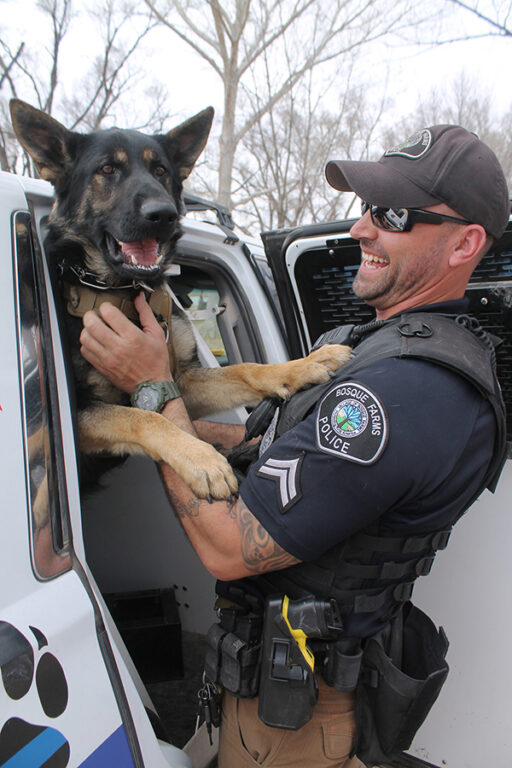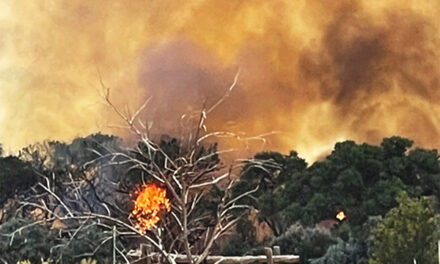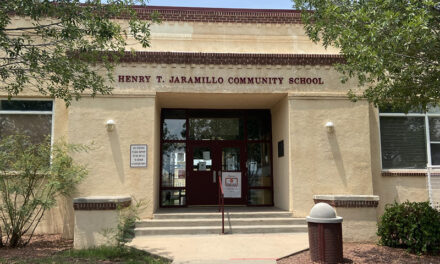BOSQUE FARMS — When most people hear the term K-9, they envision a stone-faced police officer with an equally-stoic dog.
That might be the case for some, but for Bosque Farms Police Cpl. Brad Killough and his K-9, Zella, stone-faced and stoic aren’t the usual descriptors.
Try goofballs. A couple of derps with an overwhelming enthusiasm for the job.
Many know Killough as BFPD’s K-9 handler but many more know his former fur partner, Dukan. After a series of injuries, it was determined last year, that Dukan, a Belgian Malinois, was due for retirement. He now lounges at Killough’s house, getting “fat and sassy.”
Enter, Zella, the warrior princess, a 17-month-old German shepherd with boundless energy, an eagerness to learn and just enough goofiness to match Killough’s.
“She’s kind of a goofball. I think that’s just her character. I’m not one of those handlers that likes these stoic, robotic dogs. (Goofballs) get the job done, but I feel like they’re more fun,” Killough said. “It makes them more fun to train, to advance them.”
In addition, a “goofball” tends to interact with the community better, be more approachable and welcoming at public events.
When Zella came to the village, she wasn’t quite a year old and was considered quite young for a K-9.

Julia M. Dendinger | News-Bulletin photo
The newest K-9 for the Bosque Farms Police Department, Zella, the warrior princess, greets her handler, Cpl. Brad Killough.
Throwing her into the full six-week training course at such a young age was going to be too much stress, Killough said, so he has been working with Kevin Sheldahl, the owner of K-9 Services in Albuquerque, to stretch out Zella’s training and bring her along safely.
“Kevin has 40 years of experience in training,” the corporal said. “We refer to him as the Dog Father. That dude has forgotten more about K-9 than I’ll ever learn.”
The key to any K-9 training, no matter what the speed, is to build a solid foundation of skills and commands, then it’s a matter of constantly training and improving the dog.
“If you get a new piece of equipment, you pull it out of the box, look at the schematics, turn this, push that and you’re good to go,” Killough said. “Dogs react to positive encounters and they react to negative encounters. Each one of them is different. You have to learn to read your dog.”
Dogs chosen to be trained to work with law enforcement typically exhibit certain traits early on, Killough said, a certified K-9 trainer himself.
Trainers don’t look for aggressive dogs but rather puppies who exhibit a strong sense of curiosity about their environment and willingness to engage and tussle a bit with a human.
“You wiggle a little something in front of them, see if they go for it. Hold a little sucker on his back and see how he reacts,” he said. “If he lays there like a log, it’s a good indication — not a guarantee — but a good indication there’s just no drive. If he tries to run around and bite you with those puppy teeth, then he might be sharp.”
Zella is one of the sharp ones and is on her way to being fully certified and able to track, do narcotic detection and article search, and ultimately, patrol and apprehension.
Training a dog for the first three tasks is pretty straight forward, he said. Do one of those things and the dog gets a reward. Patrol and apprehension is a longer, more stressful process.
“The dog is going into a fight. Working with decoys is like a sparring partner,” Killough said of training exercises between dogs and trained officers in protective bite suits. “It’s like two guys in the gym. They’re best friends, they step in there, they just want to see who’s who. The dog’s not being vindictive. You’re not being vindictive towards the dog.”
Training a dog for patrol starts small, like introducing a child to a sport, Killough said.
“You’re not going to put them up against a major league pitcher, throwing 95 mph balls. No, dude, you start small. You put (the ball) on the tee. It’s the same thing with these dogs,” he said.
Decoys will wear the upper part of the suit only and keep it open, so when the dog gets a grip the officer can slip out of the jacket and let the dog have the “win.”
“The dog always has to win. You’re in the suit, you might be bruised and sore but, ultimately, you’re not feeling the pain but you act like it. The dog is like, ‘I’m kicking your ass.’ It encourages that confidence so in their little minds, they’ve never lost a fight. So when it’s for real, they think, ‘And this is not going to be the time I lose.’”
Since he was a child growing up in the village, Killough has had a love of “training critters,” from his grandfather’s hunting beagles to a cousin’s rough broncs.
Beyond that love was a family tragedy that changed his perspective on law enforcement.
“My oldest brother was on again, off again with meth. He went and scored and I don’t know, maybe it was laced or something, but he went down to a hotel room swinging around a gun around, threatening everybody. This was in Billings, Montana.
“Billings PD showed up and they handled it right, man. They did everything they could but Kyle was so far gone that when he turned around and raised the pistol, one of the officers had to kill him,” he said. “And that just changed it all. I was like, I want to be more involved in that world.”
The obvious path was to become a narcotics specialist, but “that’s boring. It’s not challenging enough. Dogs, on the other hand, if you have a drug dog, it’s a totally different world.”
After graduating from Los Lunas High School in 2006, Killough served in the U.S. Army from 2006 to 2013, deploying to Iraq and Afghanistan, and became a police officer in August 2013, first joining the Grants Police Department.
He was hired at BFPD in 2015 as a patrolman, fulfilling a long-held dream of working with his hometown department.
When the department’s first K-9 handler left, Killough jumped at the opportunity to take on the role, something he adamantly attributes to a former mayor.
“God bless Wayne Ake. They were thinking of scraping the program, but Wayne gambled on it,” the corporal said. “Dogs are fascinating creatures. They’re very malleable, very trainable, and you always know where they stand. If their tails are wagging, they’re just having a good time. If they growl or bite you, you know they’re upset.”
In German, the term for a K-9 handler translates to “dog’s leader,” Killough says, which is something he takes to heart when working with his dogs on the job.
“You’re not its master. You are the dog’s leader and that’s the relationship we build with our dogs. ‘I’m your leader, bro. Trust me. Follow me. This is good for you. I’m going to make you successful but you got to trust me,’” he said. “From that point on, all credit is to the dog. If the deployment is a success and we find pounds of meth, that’s just a damn good dog. She’s awesome, but if she fails, the blame goes to you. You should have trained harder. You should have trained better.”
Training is at the core of a K-9’s success but there’s also an innate amount of enthusiasm a dog brings that makes them a joy to work with, Killough said.
“The other day, we were leaving the house and I said, ‘Let’s go to work.’ She took off in a dead sprint through the house and broke the glass on my security door,” he said with a laugh. “Can you imagine — a human partner having that much motivation to go to work?”
Julia M. Dendinger began working at the VCNB in 2006. She covers Valencia County government, Belen Consolidated Schools and the village of Bosque Farms. She is a member of the Society of Professional Journalists Rio Grande chapter’s board of directors.

















